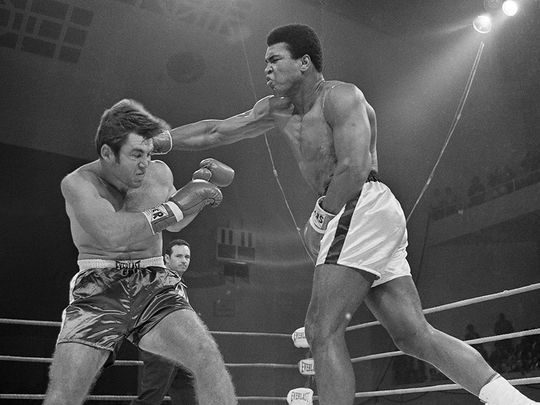
Over the decades, many sports luminaries and legends dominated the world scene. From my father, I used to hear about Stirling Moss the racing car driver, Sir Roger Bannister who broke the four-minute mile record and numerous other sportsmen.
They were all good sportsmen and people as well, but once their careers ended, they just departed from the scene. However, it was the little boy from Louisville, Kentucky, whose meteoric rise and name-change — that included his personal transformation — captured the imagination and curiosity of people worldwide.
His brash attitude, the contempt for authority that he believed enslaved his people, his rejection of control did not endear him to the American establishment of that era. However, even his most vocal opponents could not find words to attack him as he spoke.
And the reasons were many: He was anti-war, a pacifist, who openly said that he neither had any quarrel with the Viet Cong nor was he ever going to fight in a foreign war.
He was getting publicity at a time when there were other stalwarts of the Black Movement in America, such as Martin Luther King, Malcolm X and others.
He was brash, but he spoke logic. He did not in any way say things he did not mean. He had made several trips to Saudi Arabia and was viewed there not in a “Muslim context”, but more as a Robin Hood figure who rocked the establishment.
His actions and words in and out of the ring also invited attention. In pre-satellite days, people would cluster around repeat shows of his boxing matches. I had the honour of meeting him a few times. He visited us in the Arab News. I observed he was calm and quiet.
And then, one of our staff members sang: “He floats like a butterfly and stings like a bee”. And Ali jokingly jabbed him gently in the chest. We had the legendary world squash champion from Pakistan — Jehangir Khan in the office. And I proposed a “boxing match” at the entrance. Khan would take his squash racket to “strike” at the champ and Ali would avoid it. It was a delight to view those scenes.
On another occasion, he was in Jeddah during Ramadan and I approached him to join me for a family breakfast, which he politely agreed to despite the packed schedule. The news of his visit to my house spread like wildfire and throngs of people gathered outside, waiting to catch a glimpse of the champ.
A relative had once asked him what was his toughest fight and Ali looked at him in the eye and said “the courts”. He was referring to the years of litigation and the deprivation of his total. Among the words I remember are “fame is temporary and an illusion. Make good use of it for humanity”.
He was kind and gracious, not exhibiting the ego he would in front of his boxing rivals. He shook hands with each and every member of my family and walked out to where once again the cluster of people clicked their cameras. He gave me a bear-hug, stepped into the car and was driven away. I followed his life more so afterwards and his contributions to societal development and peace efforts.
No sportsman has ever been admired around the globe for his personality, principles or convictions as Muhammad Ali and I doubt there will ever be such a global icon of humanity as him. It is reported that he told his family he wanted to be remembered as someone “who tried in my life to clothe those who were naked. I want you to say that I tried to love and serve humanity”.
And he did so by bringing hope and joy to many the world over.
Farewell Muhammad Ali.
Khaled Al Maeena is a political and media analyst and former editor-in-chief of the Arab News and Saudi Gazette.












